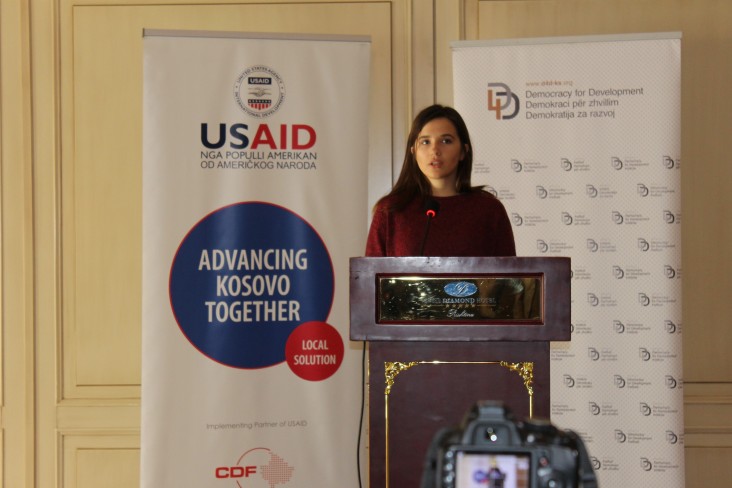Speeches Shim

March 2018 — When 21-year-old Fjolla Azemi answered the call for applications for an interethnic internship program in Kosovo, she didn’t know what to expect. The Center for Social Development in Gracanica is only a few kilometers from where she grew up, but for Azemi and her friends, it’s a world away.
Far too many communities in Kosovo remain separated from each other, and many young people never have an opportunity to get to know people from different communities. But USAID’s Advancing Kosovo Together-Local Solutions activity, in partnership with Democracy for Development, a local civil society group, is helping Azemi and other young people across the country to broaden their horizons and build workforce skills at the same time.
Over the course of five months in 2016 and 2017, 40 interns from USAID target municipalities were given a chance to pursue their interests at NGOs and civil society organizations around the country through an interethnic exchange program. Young people from non-majority communities traveled to jobs with Kosovo Albanian organizations and vice versa. All interns were required to be enrolled in college, to know English, and to demonstrate the ability to work in a multicultural and multilingual environment.
Azemi, a student at the University of Prishtina’s Faculty of Mathematics and Natural Sciences, says she felt scared and skeptical on her first day. It was her first time visiting Gracanica, a Kosovo-Serb city just minutes from downtown Pristina, and she wasn’t sure what reception she would find. But contrary to her expectations, she says, “I felt so welcomed there. I loved it.”
She soon found herself with new friends as her Kosovo Serb colleagues welcomed her into their workplace, their social lives, and even their homes. Her once-skeptical friends were soon a part of things, too, coming to workshops sponsored by the NGO, and experiencing their own warm welcome. One of them even started interning in Gracanica with Azemi.
Because most Kosovo Albanian and Serb kids no longer grow up learning each other’s language, they practiced the two languages with each other, using English as a common language to communicate.
For Azemi and many of the other interns, the internships were also their first time in a workplace setting, their first opportunity to see how the responsibilities of working life differed from their lives as students. Azemi says she learned how to be efficient and to use her time wisely. Even though some projects were challenging for her, she appreciated the trust the Center for Social Development had in her to learn new things.
By the end of her two months, neither Azemi nor the center were ready for the experience to end, and the center hired her as a full-time employee for the next eight months. Now back at school, she says that the internship experience was the best thing that has ever happened to her.
“It literally changed my way of thinking. Programs like this are very much needed to change mindsets in Kosovo,” says Azemi.
USAID’s Advancing Kosovo Together-Local Solutions activity, which runs from 2014 to 2018, aims to increase constructive interethnic cooperation between Kosovo’s majority and minority populations, which is vital to the security and stability of the region. The program takes a holistic approach toward the integration of minority populations by partnering with municipalities and other government entities to support targeted communities. In particular, the program works to improve conditions to enable ethnic minorities to actively engage in the workforce and Kosovo institutions while preserving and protecting their unique cultural heritage. The program has awarded more than 120 grants to businesses and nearly 50 grants to civil society organizations to facilitate interethnic cooperation.
LINKS
Follow @USAIDKosovo, on Facebook, on YouTube

Comment
Make a general inquiry or suggest an improvement.